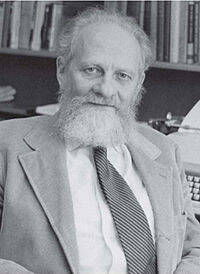Peter M. Blau

Peter Michael Blau (1918-2002) was an Austrian-born sociologist from a Jewish family, who after serving a ten-year sentence in prison for high treason against the government (writing for an underground social-democratic newspaper and speaking out against repression by the government) and imprisonment again for attempted escape after the Nazi annexation of Austria and after escaping to France, eventually emigrated to the United States where he received his PhD under Robert K. Merton. Blau was a founder of exchange theory at the micro and macro level, which he tested using statistics. His exchange theory states that the social structure, which consists of personal transactions between people, induces differences in status and power, leading to legitimization and organization, which in turn bring about opposition and change.
In his early article The Dynamics of Bureaucracy (1955), Blau showed that:
- guidelines sometimes have unintended consequences that are unwelcome from the organization's point of view;
- deviations from the rules have desirable latent functions.
He showed that employees react to external (time) pressure and internal (control) pressure, resulting in a role conflict between orientation on the quality of work and formal correctness of implementation on the one hand and on the speed and number of products/services on the other.
Application to the management of safety
Blau's theory of social exchange can be used to understand how employees' perceptions of the costs and benefits of safety practices and behaviors can influence their adherence to safety protocols. By examining the factors that determine employee safety perceptions, organizations can identify and address potential barriers to effective safety management.
By tapping the button below, you can read a summary of Peter Blau's book containing his articles on organizational research.